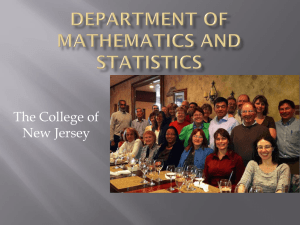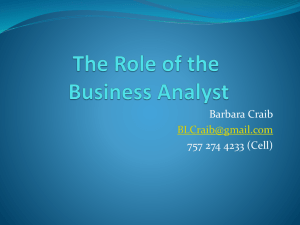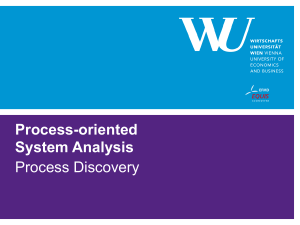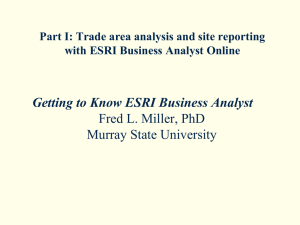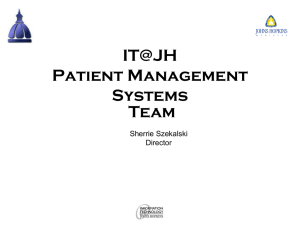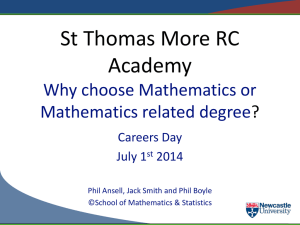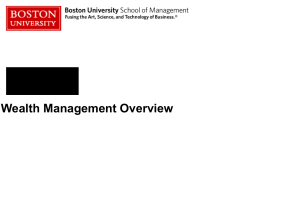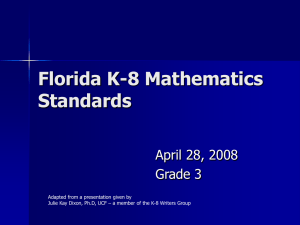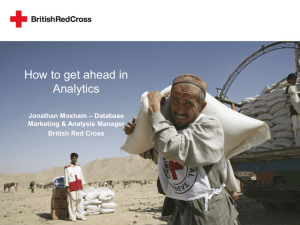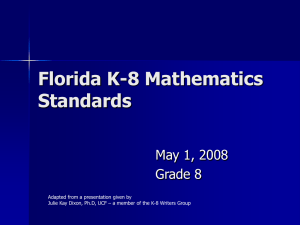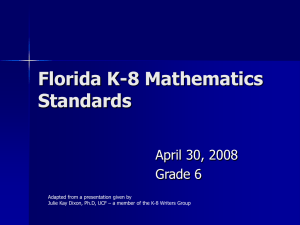Mathematics & Statistics Majors Develop Skills In
advertisement
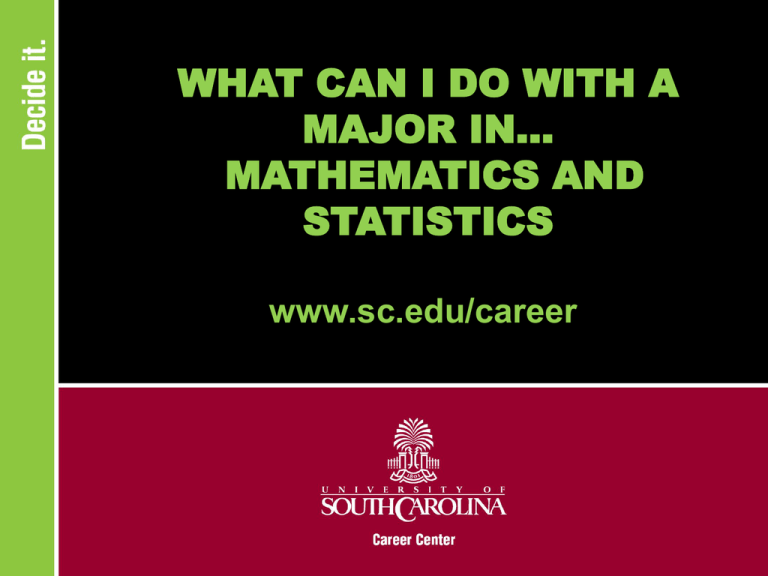
WHAT CAN I DO WITH A MAJOR IN... MATHEMATICS AND STATISTICS www.sc.edu/career math·e·mat·ics The study of the measurement, relationships, and properties of quantities and sets, using numbers and symbols. Arithmetic, algebra, geometry, and calculus are branches of mathematics. * * "mathematics." The American Heritage® Science Dictionary. Houghton Mifflin Company. 05 Aug. 2009. <Dictionary.com http://dictionary.reference.com/browse/mathematics>. sta·tis·tics The branch of mathematics that deals with the collection, organization, analysis, and interpretation of numerical data. Statistics is especially useful in drawing general conclusions about a set of data from a sample of the data. *"statistics." The American Heritage® Science Dictionary. Houghton Mifflin Company. 05 Aug. 2009. <Dictionary.com http://dictionary.reference.com/browse/statistics>. Mathematics & Statistics Majors Study Forms, arrangements, and associated relationships of numbers How to use rigorously defined literal, numerical, and operational symbols Interpretation and analysis of numerical data ...and more Specializations Most undergraduate programs offer a general course of study as well as many specializations that can be pursued with additional study. These include (but are not limited to): • Bachelor's Degree/Entry Level – actuary – computer programmer – engineer – accountant – statistician – financial analyst • Further Education Required – operations researcher – applied mathematician – statistical analyst – mathematical researcher – mathematical professor – economists Mathematics & Statistics At The University Of South Carolina Undergraduate Degrees Bachelor of Science (BS) Majors: Mathematics General mathematics, Applied mathematics, Actuarial mathematics and statistics, Mathematics education, Intensive major (any aforementioned emphasis plus an additional 4 courses in MATH numbered about 500) The university also offers a Minors in Mathematics, Actuarial Mathematics and Statistics Mathematics & Statistics At The University Of South Carolina Graduate Degrees Master of Arts (MA) Master of Industrial Statistics (MIS) Master of Sciences (MS) Master of Mathematics (PM) Doctor of Philosophy (Ph.D.) Statistics At The University Of South Carolina Undergraduate Options Bachelor of Science (BS) Major: General Statistics Statistics with an emphasis in actuarial mathematics and statistics • The university also offers a Minors in Mathematics, Actuarial Mathematics and Statistics Statistics At The University Of South Carolina Graduate Degrees Certificate of Graduate Study in Applied Statistics (CAS) Master of Industrial Statistics (MIS) Master of Science in Statistics (MS) Doctor of Philosophy in Statistics (Ph.D.) Mathematics & Statistics Majors Develop Skills In • Problem solving • Ability to analyze & interpret data • Logical thinking • Systemizing skills • Organizational skills • Critical thinking • Testing skills • Team skills • Advanced quantitative skills • Numerical computation • Computer literacy • Efficient Statistics Majors Develop Skills In • • • • • Problem Solving Logical thinking Systemizing skills Critical thinking Advanced quantitative skills • Computer literacy • Verbal and written communication skills • Ability to analyze and interpret data • Evaluating theoretical models • Organizational skills • Teamwork skills • Numerical computation • Ability to design experiments • Advising skills Employment • Mathematicians and statisticians are in great demand and work in various settings. Salaries and working conditions are excellent. Statisticians evaluate the safety and efficacy of new drugs for pharmaceutical companies. Insurance companies use statisticians to estimate the risks of life, health care, and casualty events. Conducting the Federal census and estimating the inflation rate are two of many tasks done by government statisticians. Industrial statisticians design experiments to improve manufacturing processes and to maintain quality. Market research companies use statisticians to improve the efficiency of their mass mailing campaigns. Statisticians develop credit scoring algorithms for financial service companies. Educational testing companies use statisticians to measure the validity of standardized test questions. And these are only some of the places mathematicians and statisticians work. Employment Settings • Business & Commerce: Includes management and direction of for-profit organizations including the development of business plans, marketing strategies, product development, and human resource management. Sample Occupational Titles Associated With Business & Commerce • • • • • • • • • • • Accountant Bank Manager Commodity Manger Consumer Loan Credit Officer Economist Quality Assurance Analyst Risk/Insurance Analyst Cost Estimator Financial Consultant Urban Planner Marketing Information Analyst • • • • • • • • • Actuary Auditor Bookkeeper Development Manager Financial Analyst Institutional Buyer Investment Banker Marker Research Analyst Business Analyst Employment Settings • Science Fields Combines mathematics and statistics with an emphasis on the sciences Sample Occupational Titles Associated With Science Fields • Astronomer • Cryptographer/Cryptolo gist • Physicist • Value Engineer • Lab Technician • • • • Environmental Scientist Pollution Meteorologist Scientist Applied Science Technologist Employment Settings • Consulting: Includes mathematical and statistical research; surveying, social/cultural assessments, designing bilingual and bicultural curricula; assessing services, and more. Sample Occupational Titles Associated With Consulting • • • • • • • • • Accountant Bank Manager Commodity manger Consumer Loan credit Officer Demographer Economist Estate Planner Inventory Control Specialist Research Analyst • Statistical Consultant or Programmer • Actuary • Data Analyst • Institutional Buyer • Investment Banker • Auditor • Financial Consultant • Marketing Information Analyst • Urban Planner Employment Settings • Education: Includes classroom instruction, curricula development, research, writing, administration, program management, and lecturing. Teaching and research positions at colleges and universities require an advanced degree. Most other teaching positions require appropriate certification. Sample Occupational Titles Associated With Education • • • • • • • • • Administrator Admissions Evaluator Author/Writer Career Counselor College or University Professor Financial Aid Director Guidance Counselor Health Educator Lecturer • • • • Primary School Teacher Program Manager Residence Hall Director Secondary School Teacher • Student Affairs Professional • Text Writer Employment Settings • Analysts Skilled at analyzing data; experts who study financial data (on credit or securities or sales or financial patterns etc.) and recommend appropriate business actions. This also includes a licensed practitioner of psychoanalysis. Sample Occupational Titles Associated With Analyzing • Quality Assurance Analyst • Risk or Insurance Analyst • Estate Planner • Game Designer • Algorithm Designer • Applications Programmer • Research Analyst • • • • • • • Data Analyst Mortgage Researcher Statistician Weight Analyst Business Analyst Inventory Analyst Marketing Information Analyst • Operations Research Analyst Other Occupational Settings For Mathematics And Statistics Majors • • • • • • • • Aerospace Companies Market Research Firms Banks Mortgage Companies Colleges & Universities Pharmaceuticals Computer Firms Research & Development Firms • Economic/Social Science Pollsters • Engineering Firms • School Systems • Insurance Companies • Stock Brokerage Houses • Investment Firms • Test Development Corporations • Manufacturing Firms • Utilities • Savings & Loan Associations Strategies For Developing Skills To Get The Job You Want • Pursue an excellent academic record • Obtain part-time, summer, or internship work experience • Volunteer with service and counseling organizations • Become fluent in a foreign language • Obtain an advanced degree and/or certification in order to perform substantive counseling work • Obtain a minor in an additional area of interest (i.E. Language, business, education) • Develop strong writing and speaking skills Strategies For Developing Skills To Get The Job You Want • Develop strong quantitative and statistical skills • Become comfortable working with people from different backgrounds and cultures • Acquire sales experience • Become active in peer mediation groups if available • Secure leadership positions in campus or community groups • Obtain teaching certification • Shadow the work of a professional Resources For More Information USC’s Department of Mathematics www.math.sc.edu/ USC’s Department of Statistics www.stat.sc.edu/index.html Career Center library http://www.sc.edu/career/Library/library.html Mathematics and Statistics Related Websites http://www.sc.edu/career/la/mathstats.html College of Arts and Sciences Career Development Program www.sc.edu/career/cascdp/index.html Books & Web Resources Books 101 Careers in Mathematics by Andrew Sterrett Web Resources Mathematical Association of America http://www.maa.org/ Great Jobs for Math Majors by Stephen Lambert and Ruth J. DeCotis Institute of Mathematical Statistics http://www.imstat.org/ Career Center Contact Information University of South Carolina Career Center 6th Floor, H. William Close Building (BA Building) Columbia, SC 29208 Phone: (803) 777-7280 On-call counseling without an appointment: M - F, 1:00 am - 4:00 pm (Summer and holiday hours may differ, please check the website at www.sc/edu/career)
